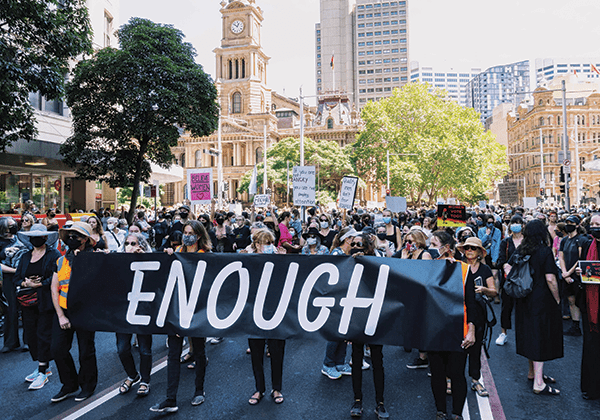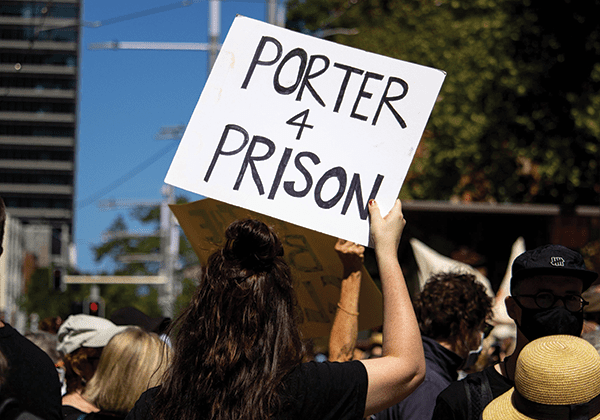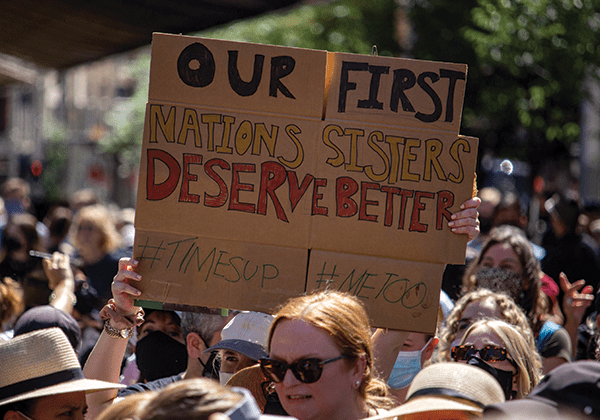Following a wave of sexual assault allegations against the country’s most powerful men, thousands flooded Sydney’s CBD on Monday afternoon to demand that Parliament take action and accountability.
The crowd of around 10,000 people packed the streets of Town Hall, carrying placards that expressed sentiments such as “My outrage does not fit on this sign,” “Believe Victims. Stop Silence. End Violence,” and “Smash the patriarchy.”

Speakers voiced their anger, frustration, and determination to seek justice for survivors of gendered violence. “We are marching and we won’t stop marching until we have justice, until we have change, and we end the system that enables the mistreatment of women,” declared the rally’s chairperson.
Aboriginal Elder Aunty Shirley gave a Welcome to Country and described the systemic mistreatment of Aboriginal women as “less than human beings” since colonisation, saying that, “when you talk about the historical facts of rape of women…go back to 1788.”
Dunghutti woman Marie Barbaric also shared her lived experience as a victim of sex-trafficking as a child and the need for the government to “recognise their obligation to ensure human rights are supported.”
After the main demonstration, the crowd marched across Hyde Park and regrouped in front of NSW Parliament House. Jenny Leong, Greens member for Newtown, remarked how there are “toxic masculinity problems in every political party in this country,” and that issues of assault and rape “are not limited to Canberra.”
Rallies represent an ‘uprising’

University of Sydney Professor Catharine Lumby stated that the protests are a “powerful sign of the reckoning we are witnessing in this country—a reckoning with the reality of the epidemic of sexual assault and sexual harassment that women in this country have lived with for far too long.”
The rally was one of forty convened across the country, organised by the March 4 Justice movement, and comprising the “biggest uprising of women that Australia’s seen” according to organisers.
While senior cabinet ministers, including Federal Minister for Women Marise Payne, snubbed the movement’s centrepiece rally in Canberra, state MPs from both sides of the political aisle were among the crowd in Sydney, including Deputy Premier John Barilaro, Minister for Women Bronnie Taylor, Opposition Leader Jodi McKay, and Deputy Upper House Leader Adam Searle.
Also present were unions including the NSW Nurses and Midwives’ Association, Community and Public Sector Union, NSW Teachers’ Federation, and Australian Services Union.
Lack of First Nations engagement criticised
The event was criticised by the University of Sydney Women’s Collective (WoCo), who chose not to endorse or attend the rally. “This rally is a reflection of tone-deaf, liberal feminism which ignores Black and trans women at the forefront of the movement against sexual violence,” WoCo said in a public statement.
“First Nations women are more than twice as likely to suffer from sexual violence, 11 times more likely to be hospitalised for such incidents, and suffer the brunt of gendered colonial violence.”
Although there were First Nations speakers at the event, and calls for protestors to stand in solidarity with the Black Lives Matter movement, Honi understands that March 4 Justice organisers ignored several First Nations women during the organising process, and refused suggestions to address their lack of engagement with First Nations justice.
WoCo also criticised organisers for supporting the bolstering of police powers and prisons, as “much violence comes from the police and prisons in themselves.”
“Black women in this country are dying from Black deaths in custody. They are over-policed, often facing police violence for minor ‘crimes’ such as unpaid parking fines and being drunk in public,” they stated.
None of the demands in the petition March 4 Justice delivered to Parliament involved divesting from police powers, which has been a central demand in the Black Lives Matter movement.

“When March 4 Justice calls for ‘justice’ through more policing and through greater state power, they actively alienate and harm First Nations women,” the statement continued.
Further, Honi understands that no trans women were featured as speakers, and that some attendees were spotted carrying signs which read trans-exclusionary phrases such as “Support women’s sex-based rights.”
The statement concluded: “We stand with ALL survivors of gendered and sexual violence. We believe you and stand with you. We will not politely ask for so-called equality like March4Justice or the Women’s March. We fight with you for true liberation of us all.”





